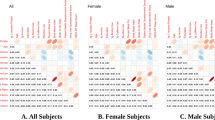Abstract
The association between temporary emotional states and systemic inflammation has never been studied. We measured the levels of systemic inflammation markers in the peripheral blood of individuals with history of mental health crisis. Erythrocyte sedimentation rate (ESR), fibrinogen plasma level, high-sensitivity C-reactive protein (hs-CRP) serum level, and white blood cell count (WBCC) were measured for each individual during routine screening examinations. History of mental health crisis was self-reported. Individuals taking psychotropic agents were excluded. A total of 4,669 males and 2,576 females were included. One hundred forty-eight (2.0%) individuals (77 males and 71 females) reported a history of mental health crisis, and 7,097 (98.0%) individuals (4,592 males and 2,505 females) did not report a history of mental health crisis. After adjustment for multiple confounders which had been associated with elevated systemic inflammation markers, the levels of systemic inflammation markers were significantly higher among males with history of mental health crisis compared with males with no history of mental health crisis, including fibrinogen plasma levels (294 ± 6.1 vs. 279 ± 1.9 mg/dl, p = 0.010), and WBCC (7.2 ± 0.2 vs. 6.8 ± 0.1 × 103 cells/dl, p = 0.039). The levels of systemic inflammation markers were not significantly higher among females with history of mental health crisis compared with females with no history of mental health crisis. History of mental health crisis might be associated with systemic inflammation in males. This finding may be relevant to the pathophysiology of cardiovascular disease in males.
Similar content being viewed by others
References
Davidson, M. 2002. Risk of cardiovascular disease and sudden death in schizophrenia. J. Clin. Psychiatry. 63(Suppl 9):5–11.
Krishnan, K. R. 2000. Depression as a contributing factor in cerebrovascular disease. Am. Heart J. 140(4 Suppl):70–76 (Oct).
Rutledge, T., S. E. Reis, M. B. Olson, et al. 2006. Depression symptom severity and reported treatment history in the prediction of cardiac risk in women with suspected myocardial ischemia: The NHLBI-sponsored WISE study. Arch. Gen. Psychiatry 63(8):874–880 (Aug).
Lett, H. S., J. A. Blumenthal, M. A. Babyak, et al. 2004. Depression as a risk factor for coronary artery disease: Evidence, mechanisms, and treatment. Psychosom. Med. 66(3):305–315 (May–Jun).
Toker, S., A. Shirom, I. Shapira, et al. 2005. The association between burnout, depression, anxiety, and inflammation biomarkers: C-reactive protein and fibrinogen in men and women. J. Occup. Health Psychol. 10(4):344–362 (Oct).
Schins, A., D. Tulner, R. Lousberg, et al. 2005. Inflammatory markers in depressed post-myocardial infarction patients. J. Psychiatr. Res. 39(2):137–144 (Mar).
Douglas, K. M., A. J. Taylor, and P. G. O’Malley. 2004. Relationship between depression and C-reactive protein in a screening population. Psychosom. Med. 66(5):679–683 (Sep–Oct).
Ford, D. E., and T. P. Erlinger. 2004. Depression and C-reactive protein in US adults: Data from the Third National Health and Nutrition Examination Survey. Arch. Intern. Med. 164(9):1010–1014 (May 10).
Libby, P. 2002. Inflammation in atherosclerosis. Nature 420(6917):868–874 (print 2002/12/19/).
Ross, R. 1999. Atherosclerosis—An inflammatory disease. N. Engl. J. Med. 340(2):115–126 (January 14).
Mental crisis. The Israel Center for the Treatment of Psychotrauma. http://www.traumaweb.org/crisis.html. Accessed on the 20th of April, 2007.
Black, P. H., and L. D. Garbutt. 2002. Stress, inflammation and cardiovascular disease. J. Psychosom. Res. 52(1):1–23 (Jan).
Muhlestin, J. B. 2000. Post-hospitalization management of high-risk coronary patients. Am. J. Cardiol. 85(5A):13B–20B (Mar 9).
Ridker, P. M., C. P. Cannon, D. Morrow, et al. 2005. C-reactive protein levels and outcomes after statin therapy. N. Engl. J. Med. 352(1):20–28 (January 6).
Ridker, P. M. 2002. Inflammatory biomarkers, statins, and the risk of stroke: Cracking a clinical conundrum. Circulation 105(22):2583–2585 (June 4).
Wirleitner, B., B. Sperner-Unterweger, and D. Fuchs. 2004. Statins to reduce risk of depression. J. Am. Coll. Cardiol. 43(6):1132, author reply 1132–1133 (Mar 17).
Statins dampen depression. Health News 9(11):7, Nov 2003.
Pearson, T. A., G. A. Mensah, R. W. Alexander, et al. 2003. Markers of inflammation and cardiovascular disease: Application to clinical and public health practice: A statement for healthcare professionals from the Centers for Disease Control and Prevention and the American Heart Association. Circulation 107(3):499–511 (Jan 28).
International Committee for Standardization in Hematology. 1965. Recommendation of measurement of erythrocyte sedimentation rate of human blood. Immunochemistry 2:235–254.
Clauss, A. 1957. Rapid physiological coagulation method in determination of fibrinogen. Acta Haematol. 17(4):237–246.
Rifai, N., R. P. Tracy, and P. M. Ridker. 1999. Clinical efficacy of an automated high-sensitivity C-reactive protein assay. Clin Chem. 45(12):2136–2141 (December 1).
American Diabetes Association. 2007. Diagnosis and classification of diabetes mellitus. Diabetes Care 30(Suppl 1):S42–47 (Jan).
Expert Panel on Detection, Evaluation, and Treatment of High Blood Cholesterol in Adults. 2001. Executive Summary of The Third Report of The National Cholesterol Education Program (NCEP) Expert Panel on Detection, Evaluation, And Treatment of High Blood Cholesterol In Adults (Adult Treatment Panel III). JAMA 285(19):2486–2497 (May 16).
Chobanian, A. V., G. L. Bakris, H. R. Black, et al. 2003. The Seventh Report of the Joint National Committee on Prevention, Detection, Evaluation, and Treatment of High Blood Pressure: The JNC 7 report. JAMA 289(19):2560–2572 (May 21).
Rasul, F., S. A. Stansfeld, C. L. Hart, and G. Davey Smith. 2005. Psychological distress, physical illness, and risk of coronary heart disease. J. Epidemiol. Commun. Health 59(2):140–145 (Feb).
Appels, A., and E. Schouten. 1991. Burnout as a risk factor for coronary heart disease. Behav. Med. 17(2):53–59 (summer).
Watkins, C., L. Daniels, C. Jack, et al. 2001. Accuracy of a single question in screening for depression in a cohort of patients after stroke: comparative study. BMJ 323(7322):1159 (Nov 17).
Author information
Authors and Affiliations
Corresponding author
Rights and permissions
About this article
Cite this article
Justo, D., Arbel, Y., Altberg, G. et al. Inflammation Markers in Individuals with History of Mental Health Crisis. Inflammation 31, 254–259 (2008). https://doi.org/10.1007/s10753-008-9072-4
Published:
Issue Date:
DOI: https://doi.org/10.1007/s10753-008-9072-4




